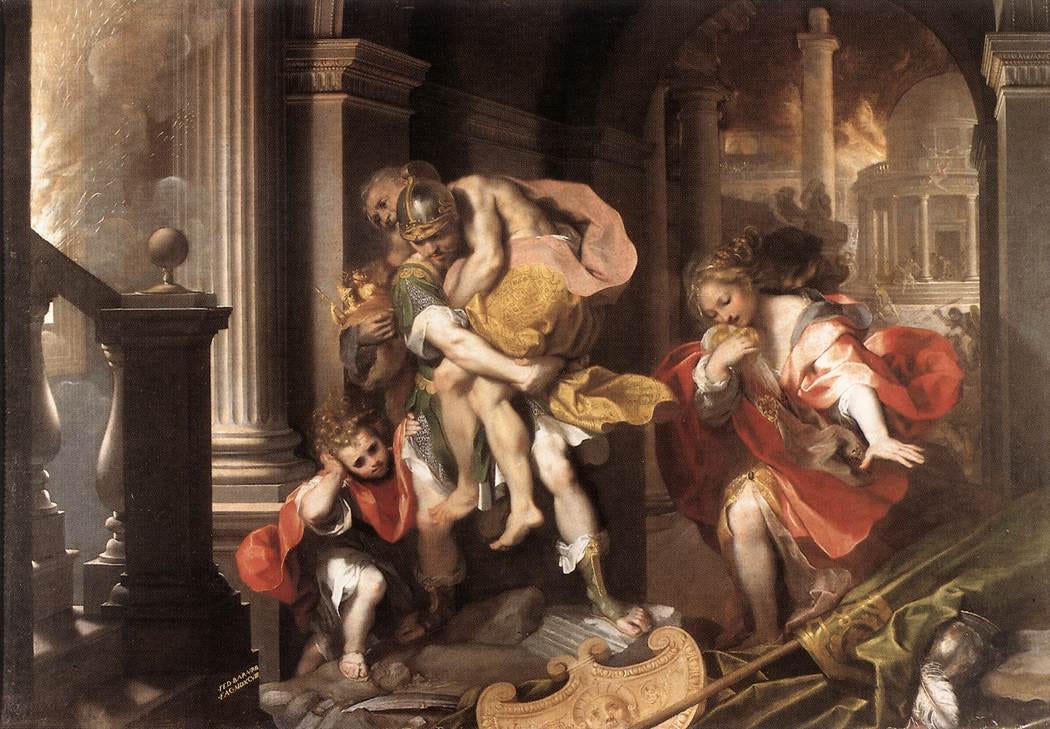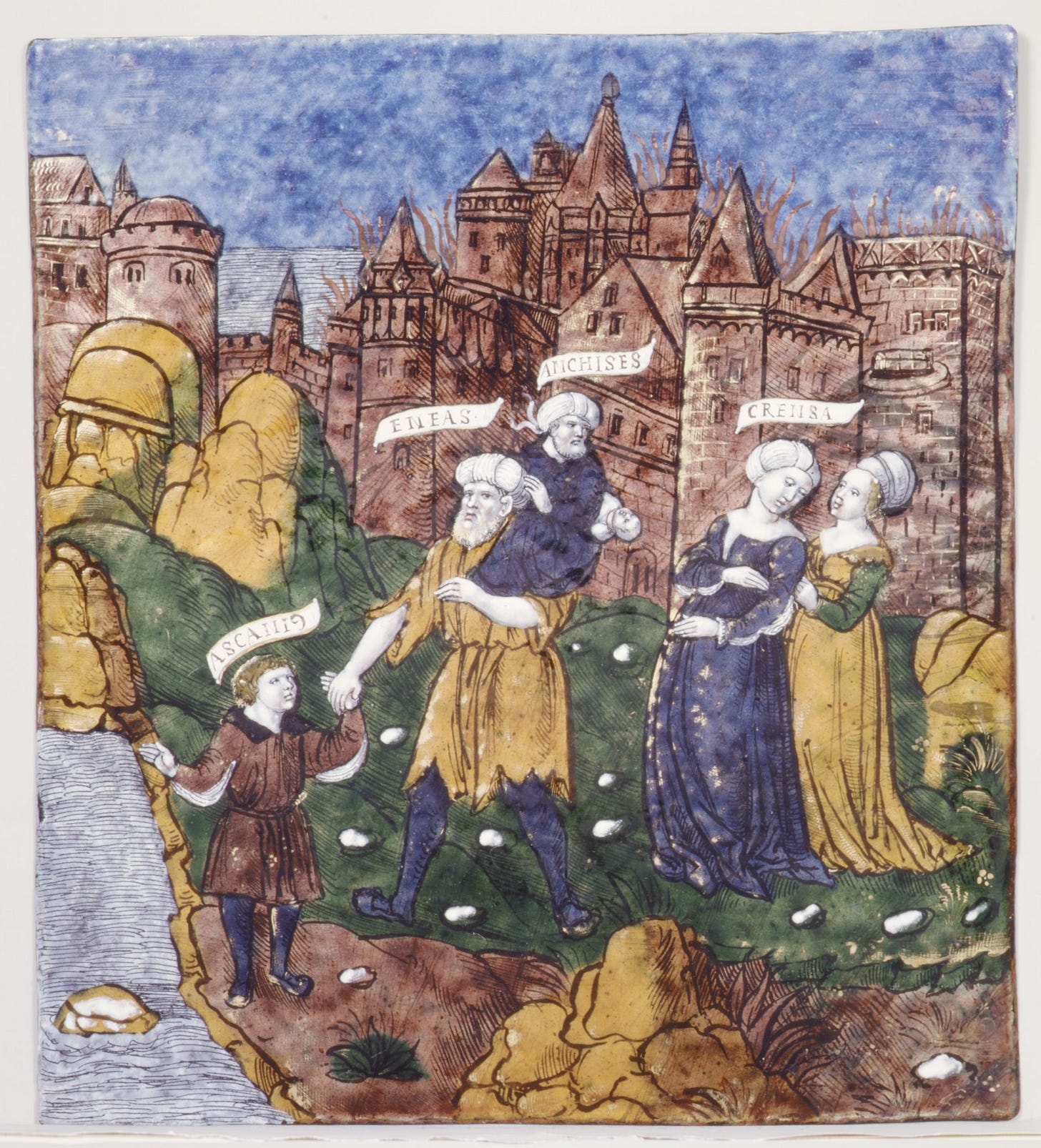
This morning I spent an hour or so discussing a few books of Vergil’s Aeneid with a group of freshmen honors students. Perhaps foolishly, I raised their expectations pretty high, revealing to them that this is probably, if I had to choose, my favorite book. To be sure, I’d be hard pressed to say that I have a favorite book. I often think in terms of favorite authors rather than favorite books, and in any case, who could possibly choose? But if I were forced to, if I were being exiled to the proverbial desert island and could take only one book along with me, I think I would take the Aeneid.
This is partly for biographical reasons, maybe even nostalgic ones. When I was a junior and senior in high school, I took a few semesters of Latin at nearby Oberlin College. Two semesters of intro work with Thomas Van Nortwick (if you’re reading, Mary, tell him hello!), which concluded with our translating Petronius’ Satyricon. And then in the third semester we were plunged into the deep end, reading several books of the Aeneid with Nathan Greenberg. (To this day I remain impressed at the audacity of challenging students in only their third semester with the Aeneid, which is by no means easy Latin.)
As we were worked our way through the text, Professor Greenberg also put a couple of secondary readings on reserve every week. I read them all. Down in the basement of the Oberlin library, where the reserve readings were held, I got my first taste of real scholarly work, marveling at those old-school classicists who somehow knew, well before the ready availability of digital texts, that a given line in Book VII was Vergil’s reworking of a similar line in Lucretius, or Homer, or another ancient poet. That I later became a professor myself is owing at least in part, I am certain, to the magic of that experience.
Personal associations aside, however, the Aeneid is an endlessly rich text that raises enduring questions of loyalty, honor, devotion, sacrifice, piety, suffering, love, bravery, self-control, free will, … and on and on, all conjured up in beautiful language and striking images. I could write quite a bit about the poem, but today I thought I might just share a pair of those images, two Vergilian similes that I’ve read many times but that stood out to me upon this reading—and that I didn’t even have time for in class!
The first comes very near the beginning of the poem. Aeneas is leading his followers from Troy to Rome when his divine antagonist, the goddess Juno, stirs up a terrible storm that sinks one of his ships, scatters his fleet, and drives him off course. As Aeneas laments his fate, a lonely and ignominious death at sea after so many trials and sorrows, Neptune rises up to soothe the storm and calm the waves. Vergil compares his appearance to a noble statesman soothing a mob:
Just as so often it happens, when a crowd collects, and violence
Brews up, and the mass mind boils nastily over, and the next thing
Firebrands and brickbats are flying (hysteria soon finds a missile),
That then, if they see some man whose goodness of heart and conduct
Have won their respect, they fall silent and stand still, ready to hear him;
And he can change their temper and calm their thoughts with a speech:
So now the crash of the seas died down, when Neptune gazed forth
Over their face….1
This early image, coming hard on the heels of our first encounter with Aeneas, offers us, and him, a model of leadership: the wise, good, respected man whose very presence is enough to calm the passions of the mob. In a poem that is about leadership and the founding of Rome, parts of which Vergil read aloud to Augustus himself, Vergil signals to us what we should hope for from Aeneas—an example he will sometimes, but not always, live up to.
We never come to a passage twice in quite the same way, and as I read this simile now, two things hovered in my mind that cast it in a somewhat new light. One was another text that I taught recently to a different class of humanities students, a text I know far less well: the Analects of Confucius. I would not venture many comments on Confucius’ political thought, but he frequently suggests that the secret to political rule is the ruler’s own virtuous character. Governance that relies on compulsion to force citizens to obey is deficient; the ideal is instead for a ruler’s own virtue to inspire his subjects to voluntary obedience through the power of his example. Vergil’s simile portrays something very much like that.
It seems to me inadequate as a political theory, I confess. On the other hand, who wouldn’t prefer to be governed by politicians who could inspire that kind of admiration? Whose charisma arises not from successful demagoguery but from virtue? For the second thing that hovered in my mind as I read—perhaps you have guessed—was that we are in the midst of a presidential election, and that it has been some time since we had leaders who were inspirational in this fashion.

The other simile comes from Book IV. Shipwrecked near Carthage, Aeneas and the city’s queen, Dido, have fallen in love (with a somewhat sinister assist from Venus and Juno). But Jupiter sends Mercury to remind Aeneas that he’s not supposed to be dawdling in Carthage, he’s supposed to be founding Rome. Alarmed, Aeneas explains to Dido that he can stay no longer, an announcement that she, understandably, does not take very well. As she alternates between despair and anger, she sends her sister to plead with Aeneas to remain a little longer. But Aeneas’ devotion to his duty is among his chief characteristics, and he stands firm:
As when some stalwart oak-tree, some veteran of the Alps,
Is assailed by a wintry wind whose veering gusts tear at it,
Trying to root it up; wildly whistle the branches,
The leaves come flocking down from aloft as the bole is battered;
But the tree stands firm on its crag, for high as its head is carried
Into the sky, so deep do its roots go down towards Hades:
Even thus was the hero belaboured for long with every kind of
Pleading, and his great heart thrilled through and through with the
pain of it;
Resolute, though, was his mind; unavailingly rolled her tears.
I suppose I could try again to draw a contemporary contrast, thinking of politicians who change their stripes as they chase after the popular mood, or perhaps of trees recently felled by hurricanes, tornadoes, and tropical storms… but I would be lying if I claimed to have thought about any of those things while reading this passage. To be honest, I don’t have a lot to say about it, except that I have always thought that it was a wonderful image of steadfastness.
That ancient tree, a “veteran of the Alps,” reaches high into the heavens, thus exposing itself to the buffets of the winds that are “trying to root it up.” But it also reaches deep into the earth, and its roots hold fast, grasping tightly and refusing to be moved. That is what Aeneas is like, pius Aeneas as Vergil calls him, dutiful, devoted, pious, faithful Aeneas. And what a model for the rest of us whenever we feel battered and beaten down by events, assailed by the wintry wind of fate wildly whistling around us.
Those, as I say, were two of the passages I didn’t get to dwell on in class. So I dwell on them with you instead, and hope that my students did not feel so pressured to read quickly and get finished that they could not pause to appreciate moments like these.
Thanks for reading, and I’ll see you next time for another installment From My Bookshelf.
This quotation, like the one below, is taken from the translation by C. Day Lewis. In class we used that of Robert Fagles, which some of my colleagues prefer. I myself am rather partial to the recent version by Shadi Bartsch. But I happen to have the Day Lewis here at home, where I’m writing, so Day Lewis it is for the moment. (And perhaps fittingly so, since this little paperback, a gift from my father way back when I took that class at Oberlin, was also the first copy of the book I ever read.)




Hi, Peter. I have forwarded this to Tom who I am sure will find it as interesting as I have.